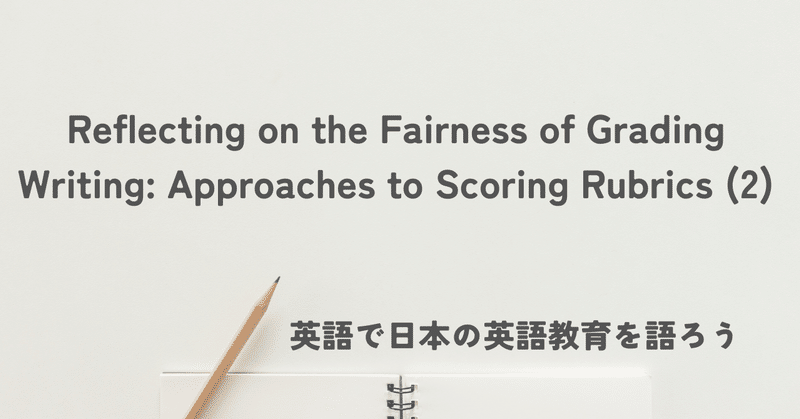
Reflecting on the Fairness of Grading Writing: Approaches to Scoring Rubrics (2)
It seems to be becoming more and more common to use rubrics to grade the essays in regular exams. When creating a rubric for scoring writing questions in regular exams, I prioritize the following aspects:
Scoring Efficiency
Fairness (Addressing variations among teachers)
Self-reflection for students upon receiving their graded work
Versatility
In my previous post, I discussed ways to enhance scoring efficiency. This time, I will focus on fairness.
Fairness (Addressing Variations Among Teachers)
In cases where multiple teachers are responsible for a course, ensuring fairness in grading during regular exams can be challenging. Using a scoring rubric can help align grading criteria among teachers.
By sharing the scoring rubric, we can, for example, agree on whether an average response gets 7 points or 5, reducing students' feelings of unfairness like "this teacher grades leniently" or "that teacher is strict".
However, even when using a common rubric, teachers often face uncertainty like "I feel this is worth 5 points, but another teacher might give it 7". To address this, as mentioned in the previous post, I always set midpoints between each criterion. When in doubt, we can use these midpoints.
"No Matter Who Evaluates It"
Another strategy is to include phrases like "no matter who evaluates it" in the rubric's wording.
For instance, we might say, "No matter who evaluates it, it can be judged as meeting all of the following criteria." This reduces hesitation about awarding a midpoint and improves grading efficiency. It also prevents students from feeling they were unfairly graded by a particularly harsh teacher. It’s beneficial for both teachers and students to have a common understanding that the grading is not based solely on one teacher's judgment.
Incorporating "Instructor’s Specific Requirements"
While showing that grading is not arbitrary, it's also essential to convey that different teachers may have specific demands. For this reason, I include descriptions like "meets the requirements specified by the instructor in class" in the scoring rubric.
Even when teaching the same material, each teacher's approach to teaching essay writing is highly individualized. One teacher might focus on how the topic sentence is structured, while another might emphasize the concluding sentence. Some may prioritize content and argument structure, and others might demand grammatical correctness or sophisticated sentence constructions.
I believe it is nonsense to impose or suppress these individual preferences in an attempt to standardize teaching content. Each teacher should emphasize what they consider crucial in essay writing to their students (of course, assuming there’s a broad common understanding, with variations in details and emphasis).
Therefore, in regular exams, in which grading should reflect the content taught in class, it is appropriate for there to be differences in how each teacher’s "focus points" are graded.
To reflect these "focus points" in grading, I ensure the scoring rubric includes phrases like "meets the requirements specified by the instructor in class." This allows for grading to consider the specifics emphasized and fed back during the class without having to align with other teachers.
From the students' perspective, if it's something emphasized in class, they should understand the deduction. Some students might argue, "another teacher didn’t deduct points for this," but if the rubric includes the "instructor’s specific requirements," there’s no issue of fairness with other teachers; other teachers will have their own strict grading points as well.
Efficient and Fair Grading
By incorporating expressions like "no matter who evaluates it" and "instructor’s specific requirements" into the rubric, we can enhance the fairness of grading. Also, by setting midpoints in the evaluation criteria, we can flexibly adopt a milder deduction for aspects that might not always be viewed strictly.
As I reiterated from the previous post, I believe the most important thing is to continue assigning writing tasks in regular exams. I hope to mitigate the burdens of grading and issues of fairness with adjustments to the rubric, thereby securing opportunities for student output and learning.
(This is an English version of my previous post, ライティング採点の公平性を考える(採点用ルーブリックのあり方②).)
この記事が気に入ったらサポートをしてみませんか?
